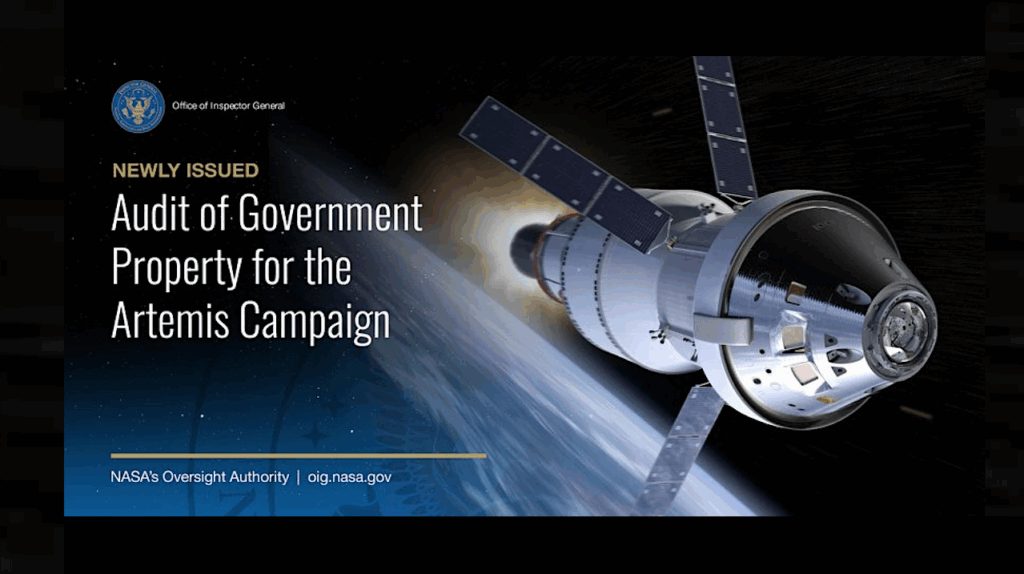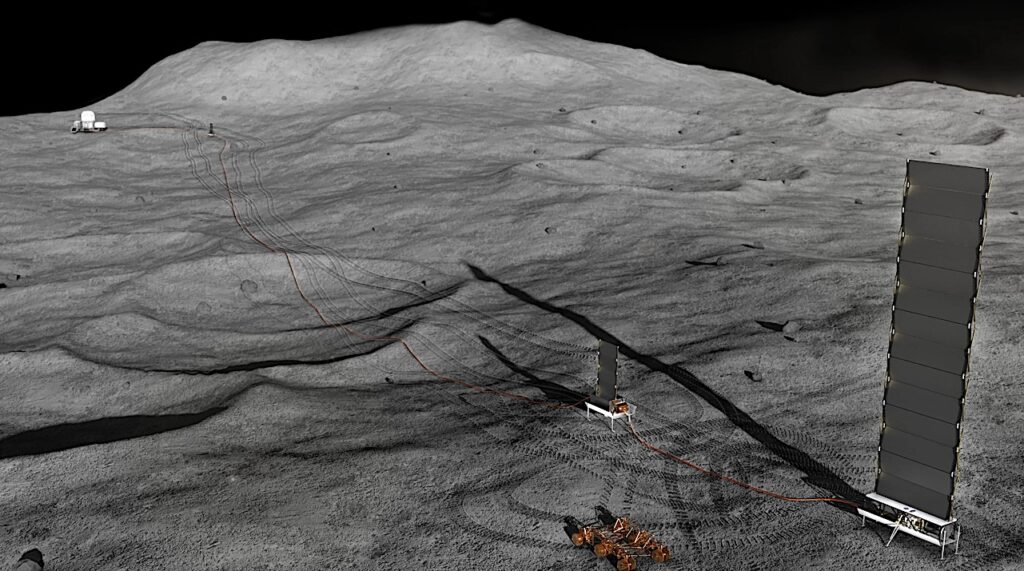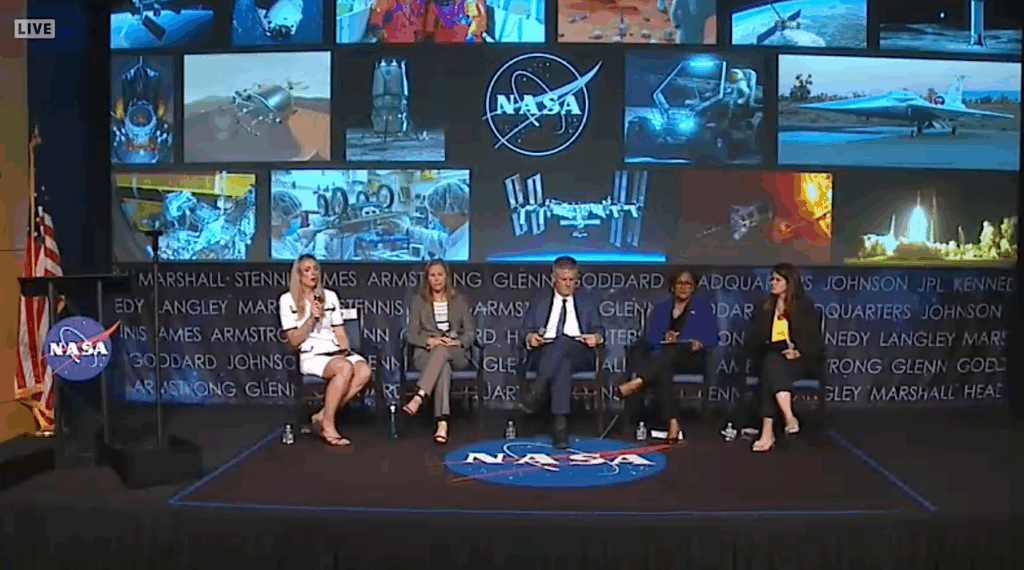NASA Authorization Bill Markup

 Keith’s note: In summary, with regard to Artemis, the Democrats do not think NASA has provided enough detail and provided some detail of their own in this bill but today they said that the detail probably does not matter. The Republicans would prefer a bill that says other things but since they are not in charge good enough is good enough. It would seem that no one on this subcommittee is actually all that interested in getting this right.
Keith’s note: In summary, with regard to Artemis, the Democrats do not think NASA has provided enough detail and provided some detail of their own in this bill but today they said that the detail probably does not matter. The Republicans would prefer a bill that says other things but since they are not in charge good enough is good enough. It would seem that no one on this subcommittee is actually all that interested in getting this right.
Show of force? NASA Administrator @JimBridenstine is at the House space subcommittee mark up. Says he’s here “because it’s open to the public.”
— Christian Davenport (@wapodavenport) January 29, 2020
Chairwoman Horn Opening Statement for Subcommittee Markup of NASA Authorization Act of 2020
“This bill has stimulated considerable debate concerning the opportunities for commercial entities in the Moon to Mars program. And I am glad that the public and stakeholders care so deeply about NASA and our civil space program. But given some of the coverage and questions about the rationale and impact for the contents of the bill, let me be crystal clear: This bill is not about rejecting the Artemis program or delaying humans on the Moon until 2028. NASA can still work to safely get there sooner. This bill is taking the fiscally responsible approach of focusing the Moon efforts on the goal of being the first nation to set foot on Mars. Thus far, NASA has provided little to no details as to what, specifically, it will do on the Moon or how any Moon activities will be extensible to Mars. This bill does not pick favorites, rather it encourages companies and industry to participate in our nation’s civil space program, which is led by NASA.”
Chairwoman Johnson Opening Statement for Subcommittee Markup of NASA Authorization Act of 2020
“And I would suggest that no one get too focused on the specific milestone dates proposed in the bill. If NASA is able to get to the Moon before 2028, or if it takes longer than 2033 for NASA to orbit Mars, that’s okay and is not precluded by this bill. I am more interested in maximizing the odds of success for this bold undertaking and making it as safe as any human journey into deep space can be, than I am in having NASA meet arbitrary deadlines.”
Opening Statement of Ranking Member Frank Lucas at Subcommittee Markup of NASA Reauthorization
“The bill before us is not the NASA authorization the Republicans on the committee would have offered if we were in the majority. However, I recognize that we are in the minority and the legislative process offers opportunities to improve the legislation. In the days since this bill’s introduction, I have heard from a wide range of advocates representing all aspects of space exploration both praising and raising concerns about the bill. I want to assure them I intend to continue working to ensure that the House-authored NASA authorization bill is the best product we can put forward that balances NASA’s priorities and resources.”
Opening Statement of Ranking Member Brian Babin at Subcommittee Markup of NASA Reauthorization
“But let me be clear, this is not an ideal bill. It is not the one I would have put forward had we been in the majority, but I can count and the majority would likely have the votes to get a bill out of committee with or without our support. Through working with the majority, I believe we have significantly strengthened their proposal in a way that fully supports the Administration’s priority goals laid out in Space Policy Directive 1. I look forward to continuing to work with the majority to incorporate input from all stakeholders, including the Administration, as we move forward.”









Ok,here is my opinion… During Apollo,we spent a grand total of 14 days-2 weeks,on the lunar surface. All of it on the earth-facing side, closer to the moon’s equator. So yeah, we have SOOOOOOO much experience (50 years ago) working on another celestial body. I also think that the earth is a 3 day trip from the moon. I will compare this to learning to drive. 50 years ago,you go to driver’s ed. You drive for 2 weeks,and never drive again.How well and safe will you be behind the wheel? With 2 weeks of experience from 50 years ago,is it a good plan to drive in LA,New York or Chicago rush hour traffic without a bit more recent experience close to home? Our first mars landing mission will be over 2 years long with the landing party spending at least a month if not two on the martian surface…
That’s a reasonable view. The Moon, in my opinion, isn’t nearly as interesting as Mars. But it is our neighbor and pretty much the Earth’s suburb. I think we should be sending explorers to Mars, but at the same time abandoning the Moon just doesn’t make sense to me. I was in England last week, but, naturally, I passed through Denver along the way (as well as a stop in Toronto.) Why not? Even if those places aren’t exciting destinations, that isn’t a good reason to avoid them. Surry isn’t all that exciting but plenty of.people like living there rather than in London. (And, as I learned, Lancaster is also a really nice place, even if it is a bit remote.) So why avoid the Moon? It’s our closest neighborhood, even it is a bit full.
Simply put, the moon has the potential of putting dollars back into the pockets of the taxpayers through the gathering of its resources, Mars is interesting scientifically but robots can handle that. If your vision is just exploration and science, sure, Mars. If your vision is for all people to utilize space, work there, and derive direct benefits, sure, Luna.
Actually, my vision is about people being able to live somewhere without being dependent on imports from Earth. Since that’s clearly not a short-term prospect, I’m for minimizing the necessary imports. Mars is better in that respect than the Moon (you don’t, for example, have to import nitrogen just to have a buffer gas you can breathe and fertilizer to grow food.)
I don’t quite understand this comment. No matter where you are, you’ll want to emulate air as close as possible simply because the human body has evolved to be most comfortable and healthy with it. It’s approx. 20% O2 and 80% N2 at 1 ATM here on Earth but as you lower the pressure, the percentage of o2 goes up to keep a human alive until you reach around 100% at 5 psi (EMU suit pressure, done so astros can move in less rigid suits). Apollo 1 demonstrated the danger of 100% O2 for long-term habitats. Of course, plants can grow at a higher percentage of O2 as long as they have access to CO2 (the Carboniferous epoch as an example which had around 40% O2 because out of control plant growth scrubbed out the carbon). In any case, Mars soil is laced with perchlorates – deadly to plant life – which would require millions of gallons of very expensive Mars water (if even available) to wash the soil clean and massive amounts of fertilizer (nitrogen-based) that would have to be imported. I don’t see astronauts as stoop labor even if farms could be somehow propagated on Mars as they would have to be massive considering the likely stunting and low yields, especially with that dim sunlight and blasting radiation. No, Mars would likely have to be permanently supplied with food from Earth and a colony there, dependent on such long transport with little or no redundancy, would eventually face starvation.
My point about nitrogen was that nothing is really air-tight. As you wrote, you really do want about 80% of the air in a habitat to be nitrogen. Some other, inert gas like argon might due, but I suspect there would be some subtle problems with that. So let’s assume nitrogen. Which has to be replaced as it slowly leaks out of the habitat. On Mars, you can get that by compressing and distilling the air, since it’s 2.6% nitrogen. Nitrogen does not exist on the Moon in any usable quantities. So you’d have to import it from Earth, just to maintain a breathable atmosphere.
As far as farming (or more properly, hydroponics) go, using martian regolith would clearly be a bad idea. But, again, a martian farmer could pump in atmospheric nitrogen and water (well, the water would be a bit scarce) and produce ammonia-based fertilizer. You can’t do that on the Moon.
Well, the cool thing about N2 is that it’s inert so once you’ve got it, you’ve got it. Occasionally topping it off shouldn’t be a problem. Of course, there’s lots of Helium on the moon which would be relatively easy to get and is used in deep sea habitats instead of Nitrogen. Our folks up there might have Donald Duck voices but otherwise be fine. Helium is used in underwater habitats, by the way, because it comes out of solution quicker than Nitrogen so shorter decompression times for divers and also doesn’t have the narcotic effect that Nitrogen has at greater than one atmosphere. Helium offers no advantage over Nitrogen at one ATM but there’s is a lot of experience using it and it appears not to damage human tissue.
If you check the numbers, the leakage rates are pretty high. Especially for EVA work. So topping off the buffer gas is actually a concern. I’m also not convinced about using helium instead of nitrogen. Yes it’s been used in deep diving, and that’s fine. But what’s the maximum duration someone’s been in one of those habitats? I think it’s a month or so, although I could be mistaken. I’m thinking of long-term effects from spending years in such an environment. Also, I think there are some issues with thermal conductivity. But those are simply details. I could put my position more succinctly by simply asking what elements are required to sustain life, how many of them are present on Mars and how few of them are present on the Moon.
You will also need to have Nitrogen for explosives.
What is Kendra Horn’s problem? She’s a moderate democrat from a non-space state, why is she so determined to hand everything to Boeing? I was expecting some republicans being Boeing puppets, but that doesn’t seem to be the case here.
I’m not sure, but the message I get from her statement is that the government needs to be in control. NASA needs to own the lunar lander, not rent taxi service from some company. Launches need to be on a NASA rocket (SLS) not something operated by a private company. Etc. That attitude isn’t space-related; it’s a philosophy of government in general. It also isn’t exactly a Democrat versus Republican issue; one party is more into that view than the other, but plenty of people on both sides of the aisle think that way.
Except that commercial space was strongly supported under the Obama administration. The Republican-led Congress kept cutting the budget requests in support of it.
As I said, this isn’t a clear Democrat versus Republican thing. The party which doesn’t control the White House will do things to spite the other party. Regardless of party affiliation, congressmen will vote to send money to their district. Commercial space, or new space, or whatever you want to call it happened to come up while a Democrat was President. So the other party tried to underfund it and people on both sides of the aisle tried to funnel money into the right parts of Texas, Alabama and Florida (plus a few other places.) The one thing I see in common is those people like to be in charge and give orders to others. Handing the reigns over to private companies just goes against the grain.
I find it to be some combination of fascinating and disturbing that Rep. Babin feels the need to declare his fealty to the occupant of the White House. Surely he was elected to represent the people, not anyone else?
Oh! Yes..let us have more politics. Why don’t these know all people let the NASA moguls and tech people do their work?
I’m afraid Ms. Horn’s statement offends me for three reasons. First, she says she’s heard lots of complaints about the bill, but apparently she isn’t willing to change one letter of it. I guess ordinary people are people the important folks just have to listen to before ignoring them. Second, the phrase “the public and stakeholders” flat out says that the citizens of this country are not stakeholders in what their government does. Somehow, I thought that was what democracy was all about. Finally,“our nation’s civil space program, which is led by NASA” (with the comma making it independent clauses) says that if it’s about space and isn’t military, it’s owned by NASA. I guess private and commercial spacecraft don’t exist in her world. I think this sort of top-down, elitist attitude is one of the things which cost the Democratic party the 2016 election, and if the don’t learn that lesson, it may cost them this year’s election.
I guess I’m really old fashioned. I expect congressmen to represent their constituents, not robotically serve a political party. Democrats and Republicans living in (for example) Denver actually have more in common than Republicans living in Denver and Pittsburg. I’d expect their representatives to, well, represent that.
Postulate a world where it is possible to determine the ‘vote’ of each constituent. In this world, a majority of your constituents favor Issue A, while a minority do it.
Is this what you imagine? That your vote should be ‘Yes’ because (as I have postulated, ignoring some obvious problems determining the sense of your constituents) your peeps say Yes’?
How much talent will NASA lose while Congress fiddles?
Pat, if you’ll take a look back at a couple of centuries of history, representatives have generally stood up for the needs of the voters in their districts. What Congress wants is often at odds with what the administration wants. That’s the heart and soul of the revered balance of power in our system of government. When Congress starts rubber stamping the demands of the White House, that balance is destroyed. The rubber stamp is what Putin gets from the Russian Duma. There is no debate. Putin declares he wants X and it’s served up to him with all possible haste. I’m not interested in living in a country like that.